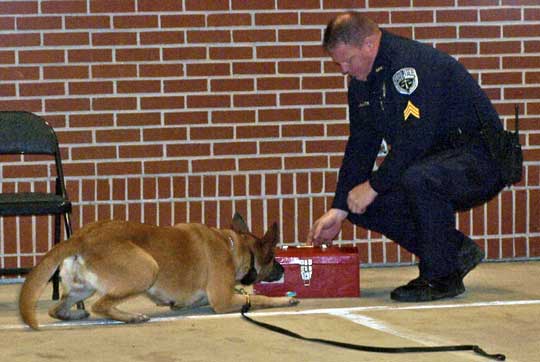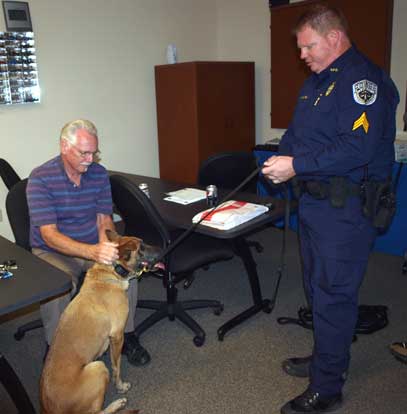 By LANA CLIFTON
By LANA CLIFTON
The Bryant Police Department has a service dog trained in explosives detection. She can also be used for evidence recovery and in search and rescue operations. Drika, a Belgian Malinois from Holland, was hand-picked for the department and is handled by Sgt. Jenceson Payte.
On Tuesday, Nov. 10, students of the Citizen’s Police Academy were allowed to witness demonstrations in which Drika recovered “evidence” that had been thrown in a grassy field. In a second demonstration, an officer set out a variety of containers in a certain area. Drika was given the command to search for an odor. She found the container with the odor and signaled she had found it by lying down in front of it. She was rewarded with a little play-time with the item inside the container.[more]

For the next demonstration, officers simulated a high-risk traffic stop. An officer in special protective gear refused to exit a vehicle. After Payte gave her a command, Drika sprang into action and grabbed the “suspect” by the arm. As Payte pulled back on the leash, Drika continued to hold on, dragging the suspect several feet. As soon as she was given the command to stop, Drika let go and sat down.
The final simulation involved a situation in which an officer, in protective gear, pretended to be a non-compliant suspect on foot. After the “suspect” ignored warnings and commands from officers, Drika was given a command and released. She jumped on top of a car that was between her and the suspect and jumped from the car to the suspect, biting the heavily padded arm and not letting go. No matter how much the suspect resisted her, Drika held on until she was commanded to stop.
Throughout all exercises, Drika was controlled with the voice commands and hand gestures of her handler, Payte. He has been specially trained in handling a police service dog. Safety was a concern during the demonstrations. Those watching were told to stay in a designated area to cut down on the risk of accidents.
Back in the classroom, Payte explained some of the history of service dogs in general and told students about the basic methods used for choosing and training service dogs.
Payte said many dog breeds in America have been bred to get rid of canine instincts that might be desirable in a service dog. For this reason, those choosing dogs to train for this type of work often go outside the country to find a dog with more natural instincts. Payte said these dogs are not meant to be pets even if they are naturally social.
Payte also said service dogs can be used as a weapon, and, as such, must be used with use-of-force guidelines in mind. He added that it is important for both dogs and handlers to be chosen and trained carefully.
“If you don’t train dogs and trainers properly, you could bring liability on yourselves and the department,” said Payte.
He said it is very important to have department standards for the use of service dogs just as with any other weapon or tool used by the department.
“Our program is a civil rights oriented program,” said Payte. “All laws apply.”
After Drika had a few minutes to recover from her demonstrations, Payte brought her to the classroom to meet the CPA students in a more relaxed atmosphere. She responded by greeting all the students, nuzzling them until they petted her.
